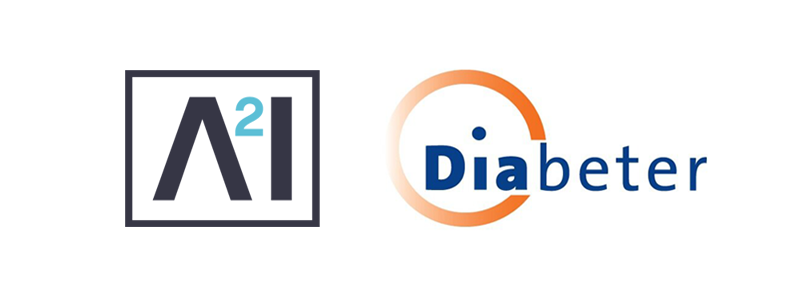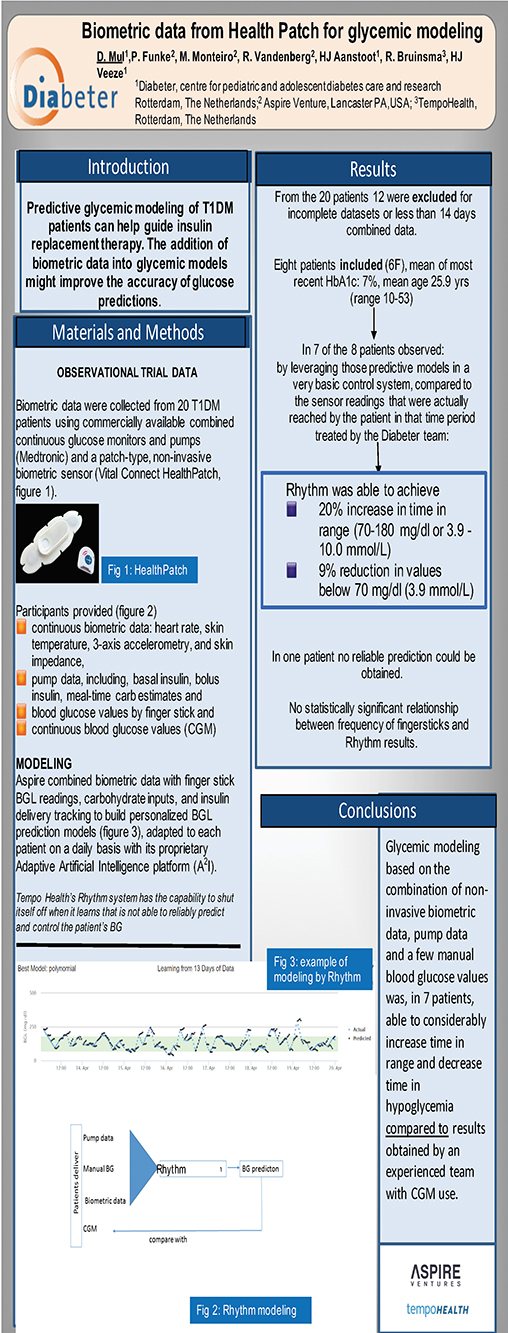
LANCASTER, PA--(Marketwired - Feb 15, 2017) -
- Aspire Ventures introduces its adaptive artificial intelligence platform, A2I, which self-assembles and self-optimizes algorithms for any business case
- Daibetter, formerly TempoHealth, LLC, an Aspire portfolio company offering a smarter way to manage diabetes, announces results of observational trial with Netherlands-based Diabeter, one of Europe's largest specialized treatment centers for type 1 diabetes in children and young adults
- Results of a small observational indicated that Daibetter's* Rhythm system -- based on A2I -- was found to considerably increase time in range and decrease time in hypoglycemia compared to results obtained by an experienced team of doctors
- Diabeter to present findings of the trial at the ATTD 2017 conference in Paris on February 15-18
Aspire Ventures today highlighted the role of its groundbreaking proprietary adaptive artificial intelligence platform, A2I, in an observational trial with Diabeter, one of Europe's largest specialized treatment centers for type 1 diabetes in children and young adults. Diabeter's doctors routinely achieve some of the best results in the world in terms of managing diabetes, and the conclusion of the study authored by the Diabeter doctors is that use of A2I would potentially significantly improve on the doctors' already world-class diabetes management results.
A2I is the backbone of the Rhythm system developed by Daibetter*, an Aspire portfolio company offering a smarter way to manage diabetes, with the Rhythm system achieving improvement of glycemic control compared to traditional monitoring in the observational trial conducted by Daibetter* and Diabeter. Diabeter, a Dutch diabetes care organization owned by Medtronic, will present the findings of the trial at the ATTD 2017 conference in Paris, France from February 15-18. Diabeter participates in several technological studies that will help improve the lives of people with diabetes.
Through the A2I platform and its ability to provide ultra-personalized, predictive blood glucose management and predictions, Daibetter* developed the closed-loop Rhythm system. This system forecasts and manages blood glucose levels of people with diabetes, based only on non-invasive biometric sensors and artificial intelligence. By leveraging personalized blood glucose prediction models that adapted to each of the eight patients that participated in the Daibetter*/Diabeter trial, and we found that in seven of the eight patients, Rhythm alone would have been able to achieve a 20 percent increase in time in range, and a 9 percent reduction in lows, as compared to the actual results achieved by active "control tower" monitoring by focused and experienced doctors and their diabetes teams using patient-activated remote monitoring.
"We were highly encouraged by the results of the observational trial we conducted with Daibetter*, as they offer a positive outlook for potential improvement of treatment in people with diabetes across the world," said Dr. Dick Mul, pediatric endocrinologist for Diabeter. "The results of this observational trial imply that the Rhythm system, using only a non-invasive biometric sensor and the Rhythm application powered by A2I, might be a tool for increasing the accuracy of blood glucose predictions in patients on CSII. The good news from the trial results is that both time in range increased and time in hypoglycemia decreased. This can be achieved without the direct need for additional or constantly invasive continuous glucose monitoring (CGM) devices and might help to reduce the need for active manual remote monitoring by a clinician. This is important, as currently not all our patients will yet be able to use sophisticated technological sensor-augmented insulin pump systems."
This technology has now been applied in patients with type 1 diabetes. Together with type 2 diabetes, these two diseases account for an aggregated annual direct medical cost of $176 billion (2012) in the United States, largely due to diabetic complications and associated hospital admissions. Essential in preventing these admissions and debilitating complications is a strict control of blood glucose values with prevention of dangerous low values (hypoglycemia). However, studies show that only one third of type 1 patients achieve a target level of glucose control that keeps them relatively safe from such complications. Applying technology that matters is fully in line with the value-based healthcare mission both Diabeter and Aspire Ventures believe in. Diabeter has and will publish data on the Diabeter methods with extensive use of eHealth, resulting in better outcomes and very low admission rates. Rhythm and A2I technology will further help even more patients reach or go below their target level of glucose control, thereby reducing the burdens of diabetes, including costs.
A2I uses a vast number of algorithms for relentless self-optimization, and through the platform Aspire Ventures helps its companies move to market faster with more precise and more personal results. A2I can utilize any type of data -- from text to video to biometrics -- and by drawing from a massive library of analytical components, A2I assembles, optimizes and combines components from multiple algorithms to build the best possible adaptive algorithm. A2I is the technology that is helping Aspire Ventures drive healthcare initiatives that are designed to break down silos, foster innovation and integration, and effect revolutionary change.
"Transforming healthcare for the better has been one of the main goals of Aspire Ventures from the beginning, and organizations like Daibetter, formerly Tempo Health, LLC, and Diabeter share our vision for making precision medicine a key to unlocking patient-centric healthcare," said Sam Abadir, Group Manager of Aspire Universal and CEO of Aspire Ventures. "The results of this trial suggest that with one virtual arm tied behind A2I's back -- as the technology didn't have access to all of the data the doctors gleaned from the invasive blood glucose monitor -- its algorithms were able to outperform the best diabetes doctors in the world in terms of predicting and managing blood sugar. Our hope is that the A2I technology can positively impact clinicians' daily lives so they're able to spend more quality time with more patients -- with the creation of better patient outcomes as the unwavering goal."
Dr. Mul will present the in-depth findings of the Daibetter*/Diabeter trial at the ATTD 2017 conference in Paris, France from February 15-18. To learn more about ATTD 2017, please visit http://attd2017.com/.
*Daibetter, formerly Tempo Health, LLC
About Aspire Ventures
Aspire Ventures, an Aspire Universal Company (www.aspireuniversal.com), is a private equity firm focused on transforming industries and impact investment. Aspire Ventures leverages its capital, intellectual property and domain expertise to help bring breakthrough technologies to market faster and more cost effectively for the benefit of people worldwide.
Aspire Ventures has developed A2I, an adaptive artificial intelligence platform, to help its portfolio companies offer innovative technologies in the areas of mobile, cloud, machine learning, and big data analytics for a variety of industry sectors, most notably healthcare. Aspire Ventures is leading several initiatives in healthcare designed to break down silos, foster innovation and integration, and effect revolutionary change, and the company's vision for healthcare is a patient-centered model that is focused on creating a better patient experience through precision medicine.
Aspire Ventures is based in Lancaster, Pennsylvania. For more information please visit https://aspirevc.com/home.
Follow us on Twitter @AspireUniversal
About Diabeter
Diabeter is a focused clinic for (type-1) diabetes headquartered in Rotterdam, Netherlands. As a cure for diabetes is yet lacking, its mission is to alleviate and prevent diabetes and its acute and chronic complications. This mission requires constant improvements in care, implementation of new technology and eHealth, with transparency on its outcomes and a clear value-addition for its patients. In this value-based healthcare concept, Diabeter also functions as a research and education center for two pediatric university clinics and has four satellite offices in the Netherlands. Diabeter is owned by Medtronic, but has a formal clinical and scientific independency. More on www.diabeter.nl.
Follow us on Twitter @DiabeterNL

